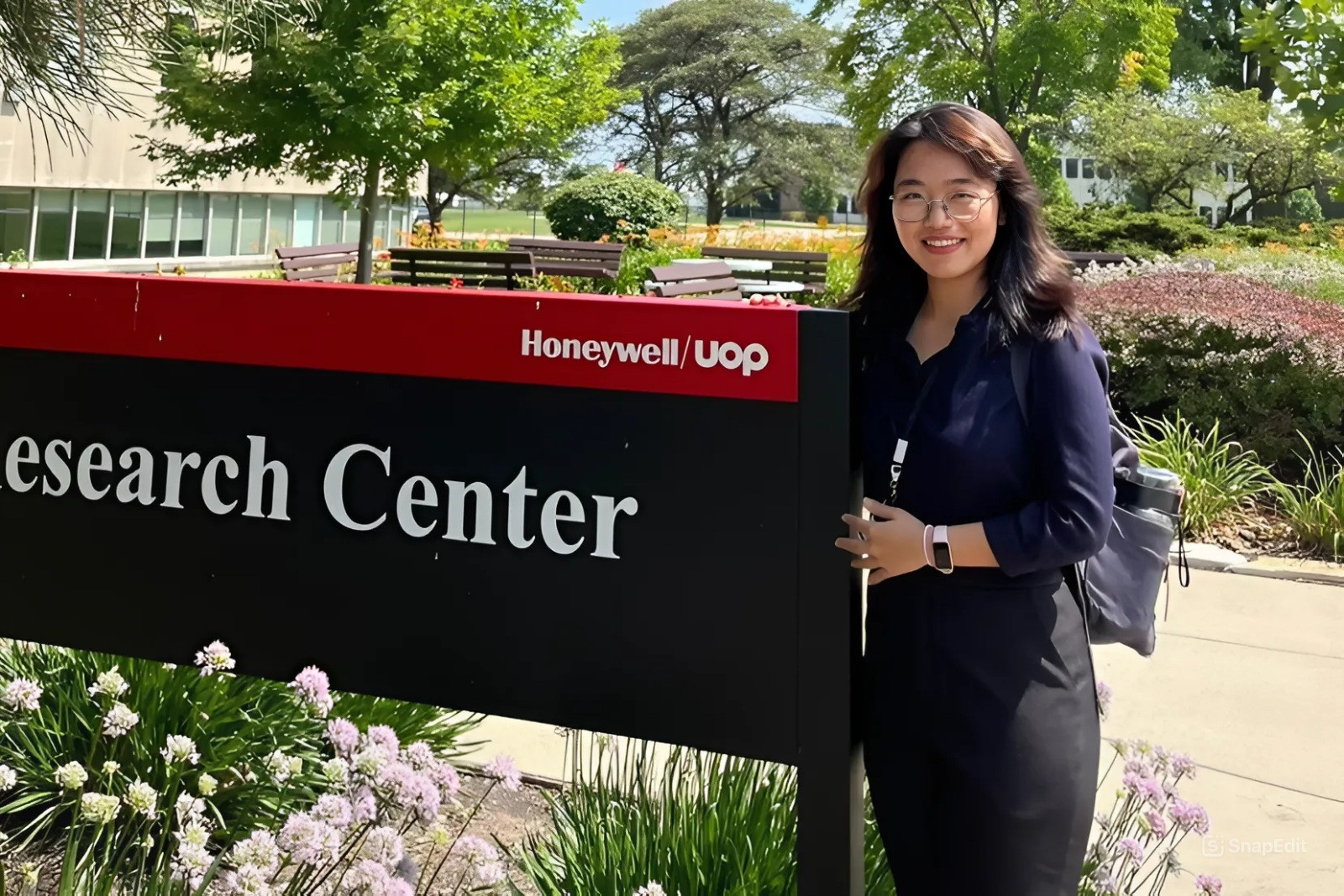
Hang, a final-year student of the Chemistry Talent Program at the University of Natural Sciences, has received the EU’s full Erasmus Mundus master’s degree scholarship for a two-year program across multiple countries, with the first year in Spain and France.
“I feel excited about this opportunity. I hope to take a step forward from conducting chemistry research in the lab to applying it in practice,” Hang said.
The former chemistry major at Le Hong Phong High School for the Gifted in Nam Dinh and a national academic competition awardee in grade 11, Hang enrolled in the University of Natural Sciences to deepen her chemistry knowledge. Joining the Chemistry Talent Program, she was mentored by leading professors, gradually opening up new research directions.
“When I started, I realized that chemistry has many subfields. Each person can excel in a specific area, and by pursuing it, you can thrive in those branches,” she said.
Following her professors’ advice, in the summer of her freshman year, Hang joined the lab led by Associate Prof Dr Mac Dinh Hung, focusing on medicinal chemistry and organic synthesis. Initially lacking experience, she was tasked with reading research papers to understand the lab’s direction. After two months, Hang was entrusted with a research topic.
Within a year, she published her first paper as the lead author in the European Journal of Organic Chemistry, a Q1 journal. Her research focused on synthesizing sulfur-containing organic compounds from pure sulfur.
“There are always challenges in every stage of research. Despite warnings from my professor, we sometimes panicked when issues arose. However, the final results always brought a sense of triumph, making research exciting,” Hang said.
The project helped her secure first place at the university’s student research conference and third place at the ministry-level research competition. At these conferences, she presented her work, receiving feedback from scientists in the field, which sparked ideas for future research.
In her junior year, Hang represented her university in an eight-day exchange program in Japan, where she attended lectures on chemistry applications in daily life, energy, environment, and semiconductors, and visited a national particle accelerator research center.
The trip made her realize that chemistry is not just about creating new substances but has diverse applications. Upon returning, she began exploring how chemistry could address real-world issues.
Turning point: an internship
In the summer of 2024, learning about an internship program at Honeywell (US), Hang decided to apply. “I discovered that the US company has a division working on green fuels using biomaterials or hydrogen energy. I found this field intriguing and wanted to join to stay updated on advancements in energy and the environment,” she said.
Outperforming numerous applicants, Hang secured a two-month internship in the US, where she participated in the production process of water electrolysis membranes.
At the end of the internship, Honeywell praised her for her eagerness to learn, openness to constructive feedback, and proactive attitude. For Hang, the experience helped “narrow down her future direction.
“I became very interested in membrane technology in the energy sector and grew more certain about my future path,” she said.
Upon returning from the internship, Hang applied for the Erasmus Mundus master’s scholarship. Shifting from organic chemistry research to membrane technology, she recognized the need for advanced study to gain knowledge in chemical engineering technology, providing a solid foundation for practical applications.
Hang applied for the scholarship with an IELTS score of 8.0, a GPA of 3.87, the highest in her faculty, and a Q1 international publication. Additionally, she had research and internship experience in the fields closely related to the master’s program.
Demonstrating research expertise and commitment to her field, Hang secured the two-year fully-funded Erasmus Mundus scholarship for a master’s degree in Membrane Engineering. In addition to tuition, she will receive a monthly stipend of 1,400 euros for living expenses.
Associate Prof Dr Mac Dinh Hung, who has mentored Hang since her sophomore year, praised her diligence, passion for research, and clear goals.
“Hang has an impressive profile. Beyond her research and internship experience, she has the highest grades in the faculty. She is one of the most outstanding students in the Chemistry Department,” he said.
Minh Hang revealed that after completing her master’s, she aims to pursue a Ph.D. and contribute to developing new applications in green energy.
Thuy Nga